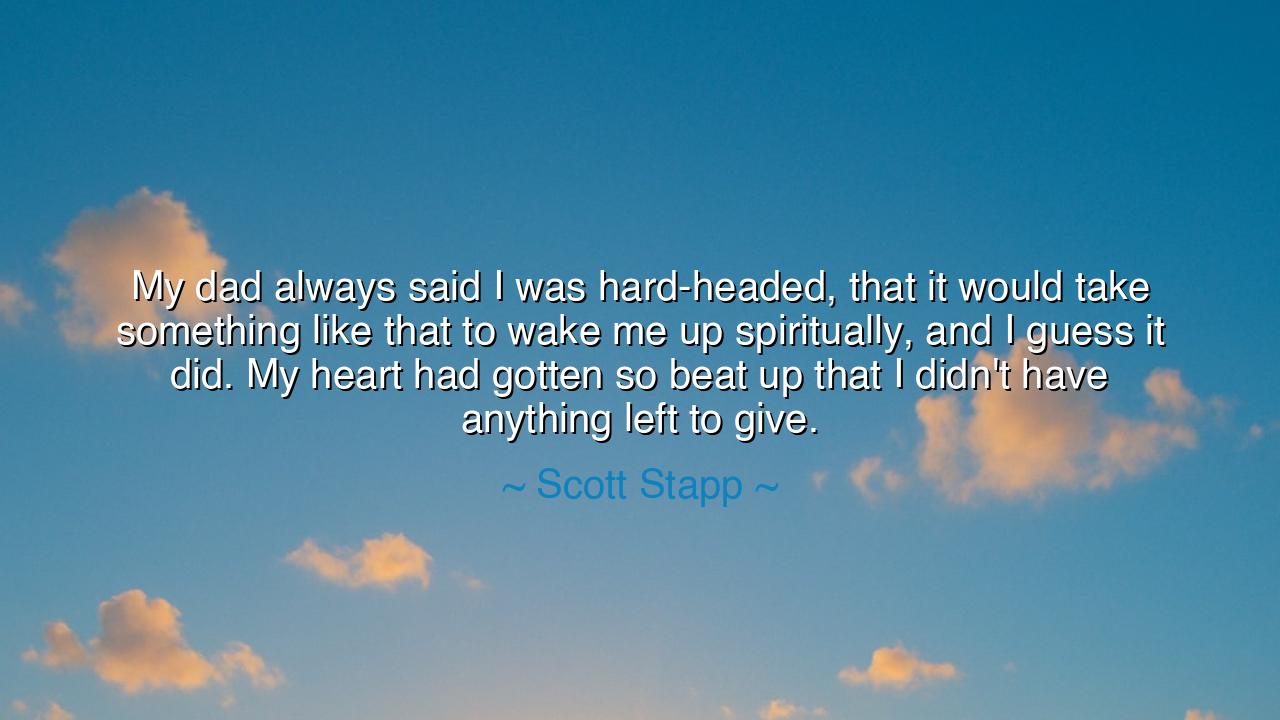
My dad always said I was hard-headed, that it would take
My dad always said I was hard-headed, that it would take something like that to wake me up spiritually, and I guess it did. My heart had gotten so beat up that I didn't have anything left to give.






The words “My dad always said I was hard-headed, that it would take something like that to wake me up spiritually, and I guess it did. My heart had gotten so beat up that I didn’t have anything left to give” were spoken by Scott Stapp, the voice of struggle and redemption, known to many as the lead singer of the band Creed. Beneath these words lies a story both deeply personal and profoundly universal — the journey from pride to humility, from spiritual blindness to awakening. In them we hear the cry of a man who walked through the furnace of suffering and emerged reborn, stripped of illusion and self-deception. It is a confession that speaks not of weakness, but of transformation — a reminder that sometimes the soul must be broken before it can be rebuilt.
When he calls himself “hard-headed,” Stapp speaks of the pride that so often afflicts the strong — the belief that one can conquer life by will alone, without bowing to anything higher than oneself. It is the condition of the ancient warrior who trusts only his sword, forgetting that fate is greater than strength. Yet his father’s words proved prophetic: the spiritually deaf are often awakened not by comfort, but by calamity. The heart that refuses to listen must be shaken, and the soul that resists humility must be humbled by pain. As the ancients said, “The gods make wise those whom they first wound.” For in suffering lies the seed of awakening — the moment when pride yields to truth.
Stapp’s own life bears the marks of this transformation. At the height of fame, with wealth and recognition surrounding him, his inner world began to collapse. Addiction, despair, and guilt consumed him. The applause of the world could not silence the emptiness within. And when he says, “My heart had gotten so beat up that I didn’t have anything left to give,” he is not only describing exhaustion — he is describing the moment of surrender, the sacred breaking point when the human will finally releases its grip and allows grace to enter. It is the place where the soul, stripped of pride and power, finally kneels before the mystery of life and whispers, “Help me.”
The ancients told this story many times. Consider King Nebuchadnezzar of Babylon, who once stood upon his palace and declared, “Is this not great Babylon that I have built by my mighty power?” For his arrogance, he was cast down, driven into madness, made to eat grass like an animal until he learned humility. Only when he lifted his eyes toward heaven did his reason return, and his kingdom was restored. Like Stapp, he discovered that the fall is often the first act of redemption — that to be brought low is sometimes the only way to rise rightly.
What Stapp calls a spiritual awakening is what philosophers and saints alike have described as the rebirth of the heart. The soul, once armored by ego and ambition, becomes tender again through suffering. The pain that seemed unbearable becomes the very fire that purifies. For when the heart has “nothing left to give,” it learns the greatest of truths: that love, strength, and grace were never meant to be manufactured by the self — they were always gifts from something greater. Thus, brokenness becomes the doorway to reconnection, and emptiness becomes the space where light enters.
There is also in his words a lesson about the power of surrender. To the unwise, surrender seems like defeat. But to those who have fallen and risen, it is the act of ultimate courage — to admit one’s limits, to let go of control, to open one’s soul to something higher. In this surrender lies freedom. For the truly awakened man is no longer enslaved by pride or performance; he is guided by purpose and peace. The warrior who once fought the world now fights only for truth.
The lesson, then, is this: do not despise your suffering, for it may be your greatest teacher. When life breaks your pride, do not curse it — bow before it, for it is shaping you into something truer. If your heart feels empty, do not see it as failure; it is the clearing where grace can dwell. The ancients would say that wisdom is written not in triumph, but in scars. And those who emerge from their darkness, like Scott Stapp, carry within them the strength to help others find their own light.
So, my children, remember this teaching: life will humble you, but humility is not defeat — it is the beginning of understanding. The heart that has been beat up and emptied of ego becomes the vessel of compassion. And when you stand upon the ashes of your old self, you will know what Stapp discovered — that the pain which once broke you was in truth your awakening, and that the love you were searching for had been waiting for you all along, beneath the silence of surrender.






AAdministratorAdministrator
Welcome, honored guests. Please leave a comment, we will respond soon